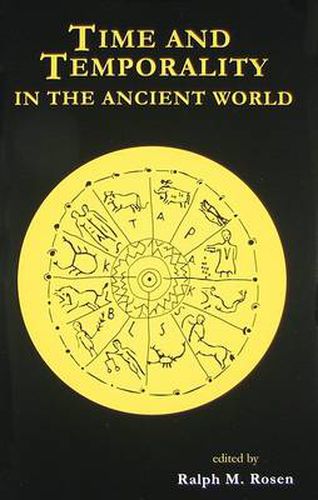Readings Newsletter
Become a Readings Member to make your shopping experience even easier.
Sign in or sign up for free!
You’re not far away from qualifying for FREE standard shipping within Australia
You’ve qualified for FREE standard shipping within Australia
The cart is loading…






Considering the topic of time in antiquity, juxtaposing cultures and societies, yields remarkable intersections, continuities, and discontinuities in the ways people have engaged with temporality.
One of the most persistent dichotomies we find across many premodern societies is that between cyclical and teleological time-time marching inexorably forward, toward a goal, and the markers of nature that seem repetitive, cyclical, and fundamentally stable. Over the millennia much ingenuity has been directed at these models. Specific examinations range from the construction of time and space in prehistory, Roman Britain, quantifications of time in Assyria and Babylonia, through aspects of time in classical India, the Hebrew Bible, China, Greece, and the Roman Empire.
With contributions by John C. Barrett (University of Sheffield), Marc Brettler (Brandeis University), Chris Gosden (Pitt Rivers Museum, Oxford), Astrid Moeller (University of Freiburg), David Pankenier (Lehigh University), Alex Purves (University of California, Los Angeles), Eleanor Robson (University of Cambridge), Ludo Rocher (University of Pennsylvania), and Michele Renee Salzman (University of California, Riverside).
$9.00 standard shipping within Australia
FREE standard shipping within Australia for orders over $100.00
Express & International shipping calculated at checkout
Considering the topic of time in antiquity, juxtaposing cultures and societies, yields remarkable intersections, continuities, and discontinuities in the ways people have engaged with temporality.
One of the most persistent dichotomies we find across many premodern societies is that between cyclical and teleological time-time marching inexorably forward, toward a goal, and the markers of nature that seem repetitive, cyclical, and fundamentally stable. Over the millennia much ingenuity has been directed at these models. Specific examinations range from the construction of time and space in prehistory, Roman Britain, quantifications of time in Assyria and Babylonia, through aspects of time in classical India, the Hebrew Bible, China, Greece, and the Roman Empire.
With contributions by John C. Barrett (University of Sheffield), Marc Brettler (Brandeis University), Chris Gosden (Pitt Rivers Museum, Oxford), Astrid Moeller (University of Freiburg), David Pankenier (Lehigh University), Alex Purves (University of California, Los Angeles), Eleanor Robson (University of Cambridge), Ludo Rocher (University of Pennsylvania), and Michele Renee Salzman (University of California, Riverside).